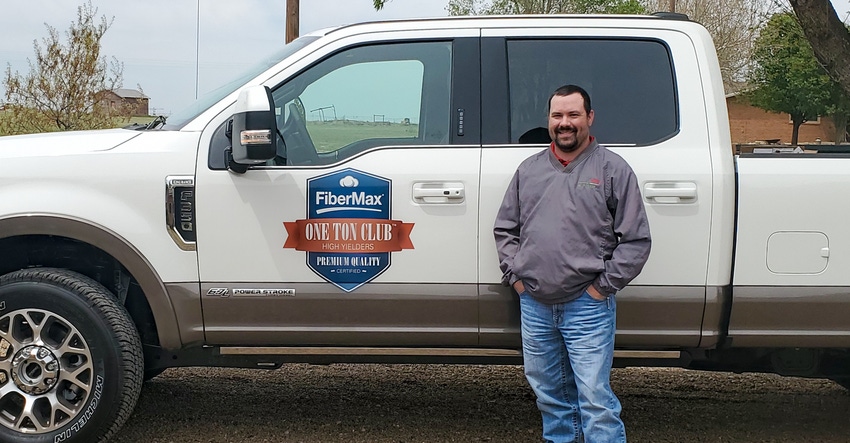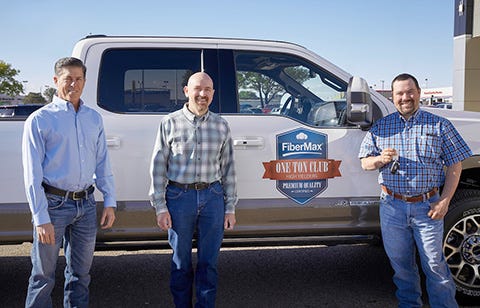
April 2, 2020, Earth, Texas, producer Blake Fennell was scheduled to attend the FiberMax One Ton Club banquet in Lubbock. Due to the COVID-19 pandemic, the annual event, which honors producers who grow at least 20 acres of FiberMax cotton yielding four-bales or greater, was canceled.
Rather than receiving a plaque or a celebratory steak, Fennell received a phone call -- one he won't soon forget.
"Keith Waters, my cottonseed rep, gave me a call on April 2, the day we were supposed to have the banquet, and said, 'What are you up to?'" Fennell says he jokingly replied, "Waiting for you to call and tell me when I can come pick up my pickup keys."
Fennell is referring to a drawing, also held at the banquet, where each One Ton Club member's name is entered to win a two-year lease on a Ford Super Duty F-350 King Ranch pickup. And although the 2020 drawing was held offsite this year, Fennell had the winning ticket.
"It took me a bit to figure out Keith wasn't joking with me and that I had won the pickup," said Fennell. And on April 17, he was handed the keys.
 (Blake Fennell (right) won the FiberMax One Ton Club truck drawing. Pictured with the Fennell are BASF Regional Agronomist Tim Culpepper, left, and BASF Seed Advisor Keith Waters. Photo credit: BASF.)
(Blake Fennell (right) won the FiberMax One Ton Club truck drawing. Pictured with the Fennell are BASF Regional Agronomist Tim Culpepper, left, and BASF Seed Advisor Keith Waters. Photo credit: BASF.)

Fennell, who began farming in 2013, is a three-time qualifier for the One Ton Club: 2016, 2018, and 2019. His 2019 qualifying crop was 132 acres of irrigated FM 1911GLT cotton, which yielded over four-bales.
Fennell's key to success? "Planting FiberMax cotton," he says.
During our interview, Fennell discussed not only his cotton but other matters on the farm:
Do you plant other cotton varieties?
No. I have tried other varieties in the past, and they don't perform like FiberMax. What I say is whenever you dump FiberMax cottonseed into your planter, you know you're getting the best quality, the best genetics, and the best yield potential for West Texas that you can get.
What cottonseed traits are important to you?
Verticillium wilt is getting to be a bigger issue in our area since we are growing more cotton, mainly from not enough water to produce corn. FiberMax is second-to-none when it comes to verticillium wilt packages, disease packages, and then fiber quality is huge. We've got to control weeds, and yes, we've got to have a good trait package. But at the end of the day, if you don't have the fiber quality, you're not going to be able to market that cotton successfully.
How do you market your cotton?
We take advantage of all the different types of marketing that we can. We do have some cotton in pools such as the PCCA pool. We use futures and options and do some acre and bale contracts as well. So, we pretty much try to split up the cotton and take a little different route to spread out our risk.
Do you have someone who markets your cotton for you?
No, the gin personnel take pretty good care of me. Fennell gins at North Gin, Sprinklake-Earth Cotton Growers, and Parmer County Cotton Growers.
In addition to cotton, what else do you grow?
I grow quite a bit of white corn or food-grade corn and wheat.
Did the mid-April snowfall along with the freezing temperatures that followed, damage your wheat?
It's a little too early to tell. We got it wet, so we'll see what happens. We're probably just going to roll the dice. But it never fails, we'll have a scare like this every year. This timeframe is one of the worst that we've had, but we always get a cool spell. We tend to overreact. 'It's ruined. It's ruined.' And then we get the combine out, and it's not that bad. So, if it's insured, we'll take it to harvest if it doesn't look completely destroyed. On some of the other fields, we'll either kill it or put some milo in or forage it somehow.
Since our initial interview April 17, Fennell met with his crop consultant April 21, and had this to say about the status of his wheat:
We are still in the beginning stages of when we can see true injury. On some of the more mature wheat, the tips of the heads are showing some burn, and we've got some leaf-burn as well. But we're going to take another look at next week to make the final decision. We probably have some yield loss from it, there's no doubt about that. We're just hoping these first signs don't develop into anything more.
How is COVID-19 affecting your operation or supply chain?
I do a lot of seed and chemical orders early, so when COVID was starting, we were proactive about making sure we got the product to the barn and in our hands in case those supply chains were disrupted. And then the daily operation is a little more of a, I wouldn't say hassle, but it's different. You've got to think through what you've got to do. It's not just, run in and grab something. For example, I went to Wylie Sprayers this morning. Usually, I go in and walk through the bins and pull out what I need. Well, now I tell them what I want, they pull it and bring it to me.
On the farm, I have three employees, but it's one of those deals where we can't stop. You've just got to do the best you can, remember hygiene, and go on.
Lastly, is the new Ford pickup a step up or a step down from what you already drive?
It's definitely a step up. I've been driving a little Chevrolet half-ton, so I'm definitely stepping up.
What's going to happen to the half-ton?
It's going to be turned out to pasture.
Special Awards
In addition to Fennell, 91 producers qualified for the club, including 14 first-time members. Five growers also received special awards:
Most Varieties: Apple Creek Farms of Garden City, Texas, earned the most varieties planted using FM 2334GLT, FM 2398GLTP, FM 2498GLT and FM 2574GLT.
Most Acres: Kitten Land Company of Lubbock, Texas, harvested an average yield of 2,164 pounds per acre on 475 acres with FM 1830GLT and FM 2498GLT.
Highest Loan Value: Micah and Magen Carter of Wellington, Texas, garnered $0.5722 on their qualifying acres with FM 1830GLT.
Highest Yield: Gary Shiflett Farms of Deming, New Mexico, harvested an average yield of 2,796.82 pounds per acre with FM 2498GLT.
Highest Gross Value: Gary Shiflett Farms earned $1,589.71 per acre on their qualifying acres with FM 1830GLT.
About the Author(s)
You May Also Like






